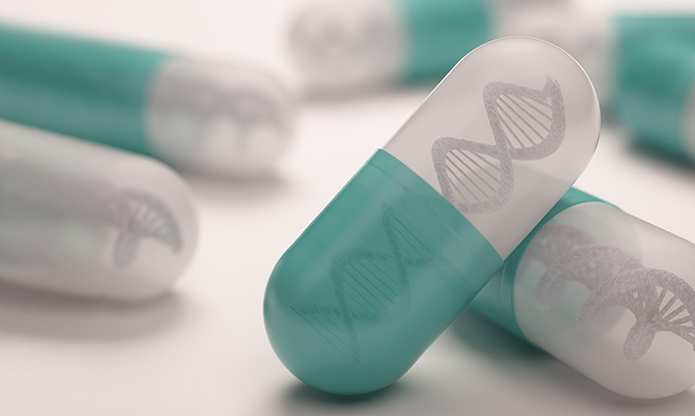The Novo Nordisk Foundation has awarded a Challenge Programme grant of DKK 60 million to Professor Nikos Hatzakis for realising the drugs of the future.
Oligonucleotides are tiny fragments of RNA and DNA that have enormous potential for curing various diseases, including metabolic and mental disorders, muscle disorders and cancer.
However, drug developers have difficulty in realising the full potential of these oligonucleotides, because most of the medicine disappears before it even affects the relevant cells.
Now a team of researchers led by Nikos Hatzakis, Professor at Department of Chemistry, University of Copenhagen is receiving DKK 60 million through the Novo Nordisk Foundation’s ambitious Challenge Programme to overcome the challenges associated with using oligonucleotides as medicines.
The 6-year research project aims to understand why most oligonucleotides disappear and to develop the technologies to prevent this from happening.
“Using oligonucleotides as medicines has huge potential in treating many types of disorders in which proteins do not function properly. The market for this type of medicine is already worth USD 5 billion annually, and this will probably increase to USD 10 billion annually in the near future. Thus, there is huge pharmaceutical and commercial interest in cracking the code to be able to deliver RNA- and DNA-based drugs to diseased cells,” explains Nikos Hatzakis.
Drugs do not reach cells efficiently
Treatments with oligonucleotides have unusually great difficulty in reaching the targeted diseased cells.
Much of the drugs disappear in the body along the way, and once the oligonucleotides enter the relevant cells, up to 95% are degraded before they have any effect.
The scale of this waste not only harms the finances of the pharmaceutical companies that manufacture drugs based on oligonucleotides but also increases the risk of side-effects and more poorly regulates the drug’s effect.
Endosomes play a key role in sorting and delivering the oligonucleotides to the cells. They are tiny internal membrane-bound structures that deliver lipid vesicles and their contents to and from the plasma membrane. However, oligonucleotides that are transported into the cells in this way must break out of the endosomes to be effective.
A few years ago, researchers, including Nikos Hatzakis, discovered that the membrane of the endosomes opens, enabling the oligonucleotides to be released into the interior of the cell, but this seldom happens. As a result, only 5% of the oligonucleotides that enter the cell have an effect, and the rest are degraded.
“This was a new discovery, and the future research will elucidate why the contents of the endosomes are not released inside the cells. If we can figure this out, the discovery could be worth billions of kroner, since it will be extremely valuable to pharmaceutical manufacturers working on drugs based on oligonucleotides,” says Nikos Hatzakis.
Developing treatment against cardiomyopathy
The research will take place in collaboration between researchers from the University of Copenhagen, Harvard Medical School, Boston Children’s Hospital and the Instituto de Medicina Molecular at the University of Lisbon. The researchers will go all the way from improving understanding of the chemical challenges of releasing oligonucleotides in the endosomes to developing a specific medicine.
Nikos Hatzakis’s group and the Harvard Medical School researchers (led by Tom Kirchhausen) will conduct in-depth studies with advanced microscopes of how the endosomes open and why the oligonucleotides are still stuck inside. They will directly observe the interactions between endosomes and oligonucleotides, study how the endosomes move in cells and use artificial intelligence for the analytical part of the research.
This knowledge will then be used by researchers at the Department of Chemistry of the University of Copenhagen (led by Knud Jensen and Nikos Hatzakis) to design oligonucleotides that do not clump together in the endosomes and are therefore more easily released into the cells.
Finally, the researchers from Portugal (led by Maria Carmo Fonseca) will use the overall understanding of the interactions between endosomes and oligonucleotides to develop a treatment for people with cardiomyopathy.
This treatment will be studied first in human heart cells and then in mice, but the goal is for it to progress all the way to human clinical trials.
“We will develop both a universal toolbox that others in this field can use when developing drugs based on oligonucleotides and a drug to show that the methods work. The tools will be like opening a treasure chest, because they can be used to develop treatments against many diseases,” explains Nikos Hatzakis, adding that funding of the size that comes with a Challenge Programme grant is absolutely essential for this type of ambitious research project.
“Research is a long-term process and is not a task that can be undertaken by a handful of researchers working together. Critical mass across disciplines is required for the project to succeed, and this can only be achieved by funding on the scale that we have received,” concludes Nikos Hatzakis.
Recipients of Challenge Programme grants in 2023
The Foundation has awarded DKK 378.7 million for seven projects within three Challenge Programme themes in 2023. The projects run for 6 years and are as follows.
RNA- and Oligonucleotide-based Therapeutics
- Nikos Hatzakis, University of Copenhagen, Center for Optimized Oligo Escape and Control of Disease (DKK 59,987,498)
- Jørgen Kjems, Aarhus University, Center for RNA Therapeutics towards Metabolic Disease (RNA-META) (DKK 59,999,374)
Prediction of Climate Change and Effect of Mitigating Solutions
- Christine Schøtt Hvidberg, University of Copenhagen, PRECISE – PREdiction of Ice Sheets on Earth (DKK 41,791,111)
- Guy Schurgers, University of Copenhagen, Global Wetland Center (DKK 59,890,858)
- Shfaqat Abbas Khan, Technical University of Denmark, Center for Ice-sheet and Sea-level Predictions (CISP) (DKK 37,020,114)
Future Agri-Food Systems
- Paul Neve, University of Copenhagen, One Crop Health for Next Generation Crop Protection (DKK 59,984,534)
- Stig Uggerhøj Andersen, Aarhus University, N2CROP – Legume Innovation for Future Agri-Food Systems” (DKK 59,997,659)
About the Challenge Programme
The Novo Nordisk Foundation established the Challenge Programme in 2014. Since then, the Foundation has awarded more than DKK 100 million every year for ambitious research focusing on global challenges.
The Challenge Programme targets research projects based on a thematic approach addressing some of the major societal challenges.
The Foundation awards individual grants of up to DKK 60 million.
Read more about the Challenge Programme here.









